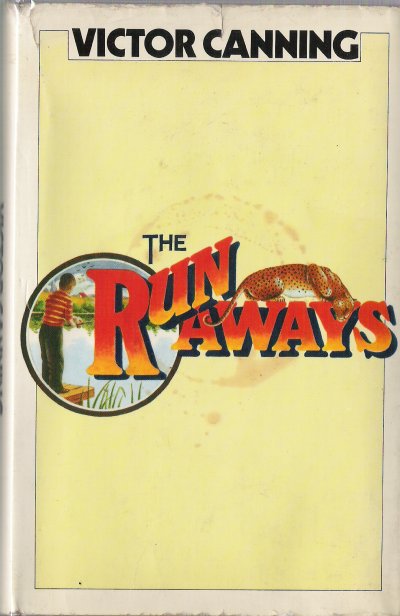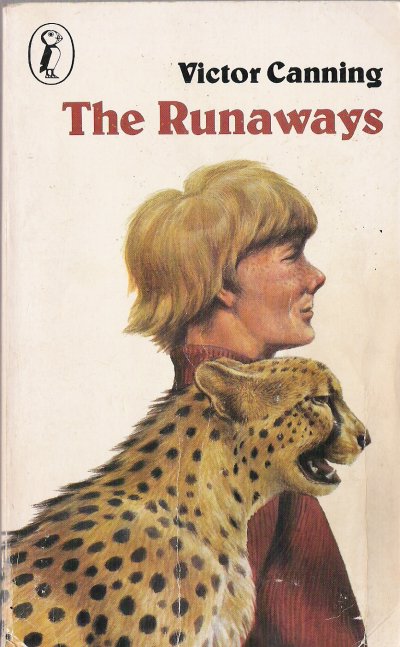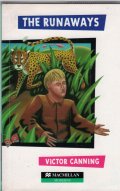
First edition 1972

Pan paperback 1973

Puffin paperback 1978

Farrago Books 2021

US paperback 1975

Smiler trilogy

Simplified edition
 First edition 1972 |
 Pan paperback 1973 |
 Puffin paperback 1978 |
 Farrago Books 2021 |
 US paperback 1975 |
 Smiler trilogy |
 Simplified edition |
The BookSamuel Miles, known as "Smiler", aged 15, has been falsely convicted of stealing an old lady's handbag. He runs away from an approved school (young offenders' prison), is recaptured and escapes from the police car during a thunderstorm. He is determined to stay free until his father, a ship's cook, returns from his current voyage in nine months time and can help to clear him of the theft charge. The same thunderstorm brings down a tree in the wildlife enclosure at Longleat, allowing a cheetah called Yarra to escape. On their first night of freedom, Smiler sleeps in the loft of a barn in which Yarra also takes shelter. We then follow their parallel stories, Smiler using a cottage in the village of Crockerton which belongs to the absent Major Collingwood, and Yarra learning to hunt again and finding a den in the Army firing range at Imber on Salisbury Plain. Smiler gets a job at a kennel called Danebury House (probably based on Heytesbury House). Yarra gives birth to cubs. Major Collingwood returns and Smiler goes to stay with the dog's meat man, Joe Ringer, who teaches him a lot of country lore including poaching skills. Meanwhile Major Collingwood is intrigued with the signs of occupation at his cottage and starts a quiet investigation. After chasing and killing a calf, Yarra is attacked and killed by its enraged mother, an Ayrshire cow. Smiler comes across the two cheetah cubs, and manages to keep them alive. Realising that if they grow up wild they could be a risk to children, he knows he has to get them back to Longleat, but does not know how to achieve this without giving himself away and being taken back to the approved school. In the end he manages to entice the cubs into Joe Ringer's van, which he drives into the wildlife park, releasing the cubs. But this means he has to go on the run again, and that is a whole new story ... |
Publishing HistoryThis was Canning's first book for children, and became the first part of a trilogy. It was published by Heinemann in 1972, and there was a Pan paperback in 1973 and a Puffin paperback in a set with the other two parts of the trilogy in 1978, followed by several reprints. There was an American hardback edition by William Morrow and Co in 1972 and a paperback edition by NY Scholastic Press with a copyright date of 1971 but a true publication date of about 1975 since it mentions the TV film on its back cover. The second book was Flight of the Grey Goose (1973), and the third The Painted Tent (1974). A combined edition of the three books in one volume appeared in 1975. There were also school editions of the three books published in the Heinemann Education Windmill series, as well as a simplified version of the first book for EFL learners. All three books, The Runaways in particular, were very successful and stayed in print longer than any of Canning's other works. A new edition from Farrago Books has been released in 2021, and an audiobook version will appear shortly. The book has the dedication "for Duncan now and Hugo later." Duncan was the teenage son of Diana Bird, the woman that Canning had recently set up house with after separating from his wife Phyllis and would later marry. Hugo was his first grandchild, son of his eldest daughter Lindel, now Mrs Lindel Williams. Canning once said in a newspaper interview that this was the book that he had most enjoyed writing, and it shows. Clearly Canning had spent a lot of time with the wardens at the Longleat Wildlife Park learning about the behaviour patterns of cheetahs, and he knew the area very well. The descriptions of nature are detailed and affectionate. All the towns and villages mentioned in the book exist, including the deserted village of Imber. Major Collingwood was a real-life person, a golfing friend of the author, father of the radio actor Charles Collingwood. The Angel Inn in Heytesbury, which Joe Ringer visits several times a week, exists and serves excellent meals. In a playful article, "Meet your author". which appeared in Puffin Post, Vol 12, No 4, 1978, when the three books were reprinted in a uniform paperback edition by Puffin Books, Canning describes how he thought up the idea and went to see the wardens at Longleat. The full text is included in the 'Smiler' Companion 2007.
|
The FilmUS TV film, released 1 April 1975Directed by Harry Harris; Script by John McGreevy Produced by Lorimar, the company mainly remembered for the TV series Dallas. Cast:
The setting is moved from Longleat and South Wiltshire to California. Johnny Miles, aged about fourteen though claiming to be sixteen, calling himself Johnny Thomas, is falsely accused of stealing a bicycle, runs away from a foster home in Los Angeles and hitchhikes to the town of "Oceanside" where he thinks he may find his father. What he finds is that his father has died four years earlier. (We never hear anything of a mother or any other family.) Meanwhile a leopard, Yarra, has escaped from the "African Adventure Wildlife Park". A farmer takes a shot at Yarra and wounds her. Johnny takes shelter in a barn belonging to the absent Mr. Collingwood, into which Yarra also creeps, and they share a box of Kentucky Fried chicken. Soon Johnny has cleaned up the shotgun wound (shades of Androcles and the Lion—Canning's Smiler would never have done anything so stupid), has tamed Yarra and is leading her around on a string. Johnny gets a job at Angela Lakey's "Karefree Kennels", and makes friends with Joe Ringer, the dogs' meat man, who teaches him line fishing from the shore and takes him on to an army firing range to dig for Indian arrowheads and other relics which can be sold to tourists. Yarra escapes. The Collingwoods return and visit the kennels where their dog has been boarded. Johnny sees Yarra on the army firing range and finds that she now has two cubs. During a training exercise Yarra and one cub are blown up by a shell. Johnny runs dramatically through a hail of gunfire to rescue the other cub. In a final scene all the characters sort out Johnny's future and he tells them how glad he is to have learned self-reliance and trust. Given the limited budget of a TV movie, it could have been a lot worse, though the relationships with animals are sentimentalised to an extent Victor Canning would never have approved of. |
||||||||
|
Lance Kidney, an English teacher sent me these comments: It is the most charming book but it is more than that. It is a superb book for young adults because it deals sympathetically with issues that affect them; not being believed, living independently without adults etc ... My experience was that boys wanted to be Smiler and girls wanted to be with Smiler. Also the vision of the English countryside and its wildlife was always a constant interest to urban children. ... I remember many years ago, whilst travelling in the West Country, taking photographs of the villages mentioned and showing maps to the pupils although generally they just wanted to get on with the story thus demonstrating the strong narrative drive of the novel. ... A masterpiece. 
|


|
|||||||||